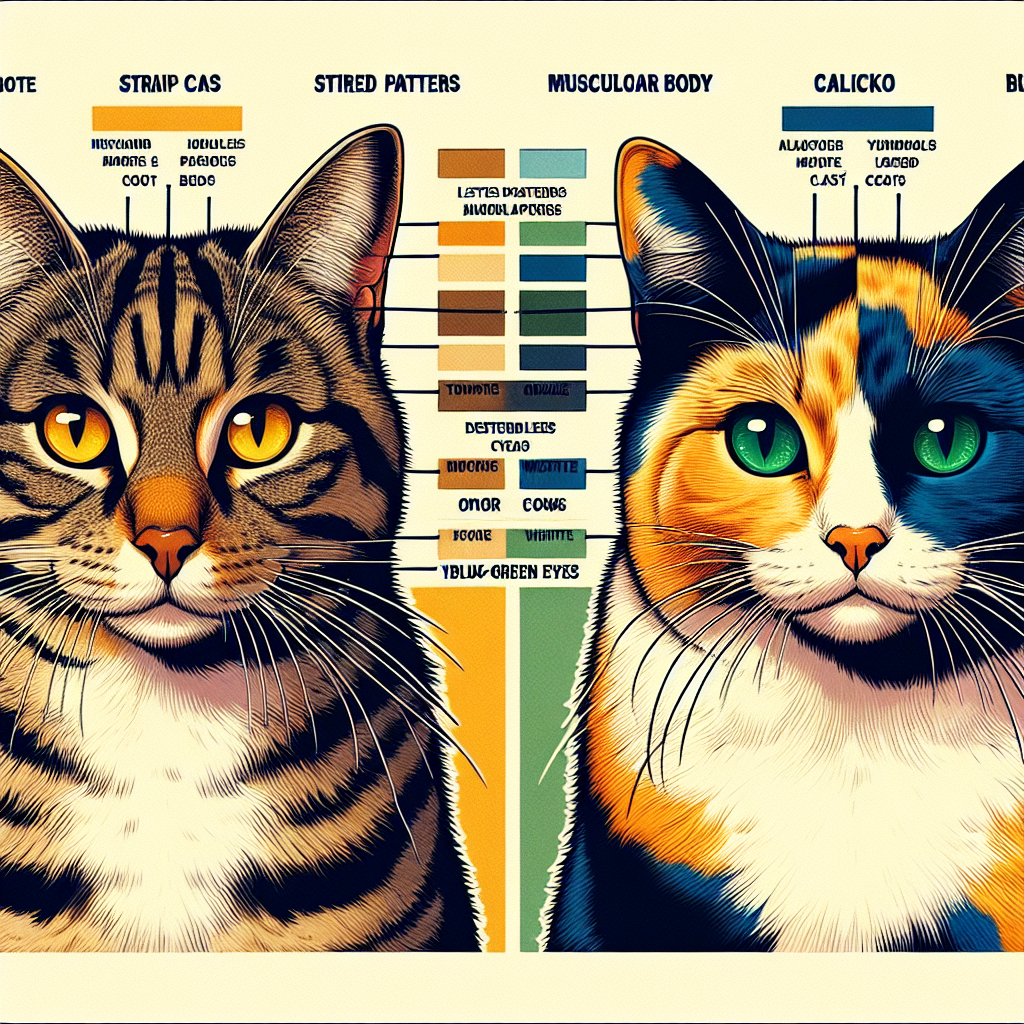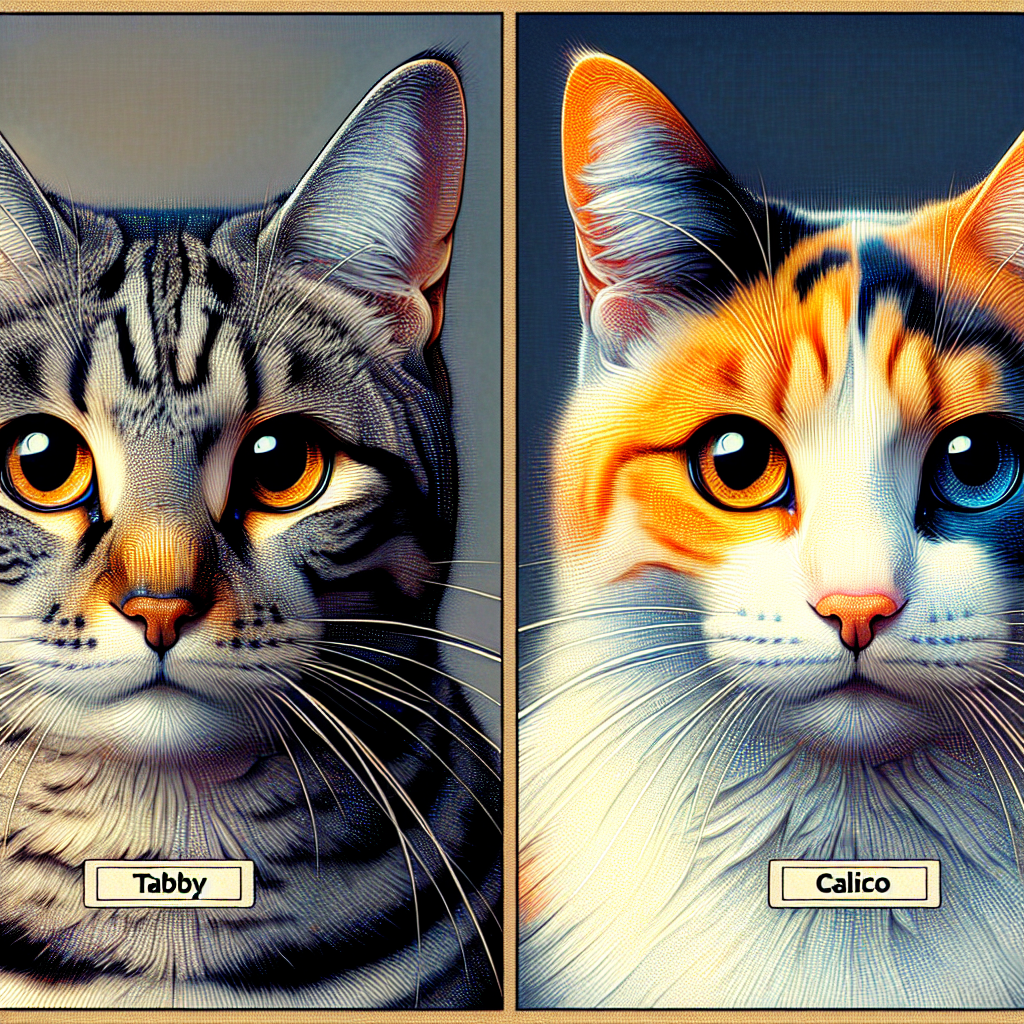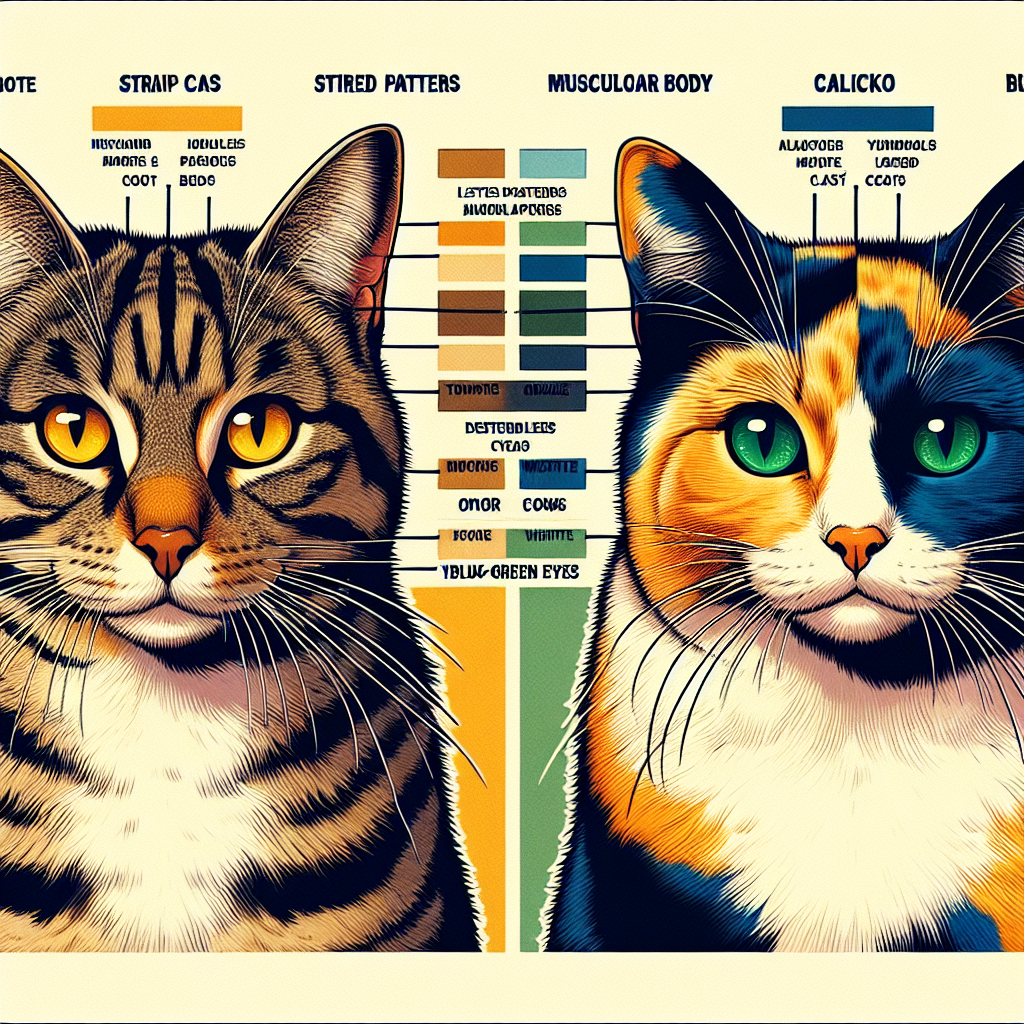So you’re wondering whether your beloved feline friend is a tabby or a calico? Look no further, because in this article, we will help you unravel the mystery and identify the unique characteristics that distinguish these two popular cat coats. From the distinct patterns and colors to the genetic factors at play, you’ll soon be able to confidently determine whether your cat belongs to the tabby or calico family. Get ready to uncover the secrets behind your cat’s beautiful coat!

Physical Characteristics
When it comes to determining your cat’s coat pattern and color, there are several physical characteristics to consider. These include coat patterns, coat colors, fur length, eye color, as well as nose and paw pad colors. By understanding these features, you’ll be able to identify whether your beloved feline friend is a tabby or a calico.
Coat Patterns
Coat patterns are one of the most noticeable features of a cat’s appearance. They can help determine whether your cat is a tabby or a calico.
Tabby Coat Pattern
The tabby coat pattern is one of the most common and recognizable patterns among cats. It features distinct markings, including swirls, stripes, and spots. Tabby cats can come in various colors and have different coat patterns.
Calico Coat Pattern
The calico coat pattern, also known as tricolor or tortoiseshell, is another striking pattern found in cats. Calico cats have patches of three colors: black, orange, and white. The distribution of these colors can vary, creating unique and beautiful patterns on their coats.
Tabby Coat Pattern
The tabby coat pattern, as mentioned earlier, is characterized by its distinctive markings. Let’s explore the different variations of tabby coats.
Distinctive Markings
Tabby cats typically have a pattern of vertical stripes on their bodies, with some variations in intensity and shape. These markings often appear on their faces, sides, and tails, contributing to their overall charm and beauty.
Mackerel Tabby
The mackerel tabby is one of the most common types of tabby coat patterns. It is characterized by narrow, parallel stripes running down the cat’s sides. This pattern resembles the bones of a fish, hence the name “mackerel.”
Classic Tabby
The classic tabby, also known as blotched tabby, features bold, swirling patterns on the cat’s sides. These patterns can resemble marbled swirls or bullseyes and give the cat a majestic appearance.
Spotted Tabby
Spotted tabby cats have spots instead of stripes on their coats. These spots can vary in size and shape, creating a leopard-like appearance. The contrasting colors between the spots and the base coat make spotted tabbies truly eye-catching.
Ticked Tabby
Unlike other tabby coat patterns, the ticked tabby has tiny, scattered stripes or spots on its fur. This gives the coat a more even and speckled appearance, making it unique among other tabby patterns.
Tabby with Stripes and Spots
Some tabby cats have a combination of stripes and spots on their coats. This pattern can create a beautiful mosaic-like effect as the stripes and spots intertwine, adding to the cat’s charm and individuality.
Calico Coat Pattern
The calico coat pattern, known for its tri-color combination, is a stunning and unique characteristic. Let’s delve into the different variations of calico coats.
Distinctive Markings
Calico cats have patches of black, orange, and white on their fur. The distribution and shape of these patches can vary greatly between individual cats, resulting in distinctive and intricate coat patterns.
Tortoiseshell Calico
Tortoiseshell calico cats, often referred to as “torties,” have patches of black and orange with little to no white. The colors blend together in a marbled fashion, creating a striking and vibrant appearance.
Dilute Calico
Dilute calicos have a softer color palette compared to traditional calicos. The black patches are replaced with gray, and the orange patches become more muted. This dilution of color gives the cat a more pastel-like appearance.
Caliby
A caliby is a unique variation of the calico pattern that also includes tabby markings. These cats have a combination of the calico’s tri-color patches with the tabby’s stripes or spots, resulting in a truly remarkable coat pattern.
Calico with Tabby Markings
Sometimes, calico cats may have subtle tabby markings on their coats, such as faint stripes or spots. These markings can add an extra layer of interest to their already beautiful and captivating appearance.

Coat Colors
Along with coat patterns, the colors of your cat’s fur also play a significant role in determining whether they are a tabby or a calico.
Tabby Coat Colors
Tabbies can come in various colors, each adding its own unique touch to your cat’s appearance. Let’s explore some of the common tabby coat colors.
Brown Tabby
Brown tabbies, often referred to as traditional tabbies, have a rich, warm hue to their coats. The combination of brown and black stripes creates a stunning contrast, highlighting the intricate pattern.
Gray Tabby
Gray tabbies, also known as blue tabbies, have a coat color that ranges from soft, silvery gray to a deeper blue-gray shade. The combination of these hues with their tabby markings creates an elegant and sophisticated look.
Red Tabby
Red tabbies, also called ginger or marmalade tabbies, have a warm, reddish-orange coat color. Their vibrant fur color combined with their tabby patterns makes them easily recognizable and irresistibly adorable.
Cream Tabby
Cream tabbies have a pale, creamy coat color with soft, delicate tabby markings. Their coat gives off a warm and gentle appearance, making them incredibly endearing.
Silver Tabby
Silver tabbies have a unique and stunning coat color that appears almost metallic. Their fur is silver-white, and their tabby markings are a darker shade of gray, creating a striking contrast that truly stands out.
Blue Tabby
Blue tabbies have a bluish-gray coat color that is both soothing and beautiful. The tabby markings on their fur retain a darker shade of blue-gray, resulting in an elegant and captivating appearance.
Calico Coat Colors
The calico coat pattern combines three distinct colors: black, orange, and white. Let’s explore some of the common calico coat colors.
Black and Orange Calico
The black and orange calico coat color is the most classic combination seen in calico cats. The stark contrast between the black and orange patches, mixed with white, creates a striking and vibrant appearance.
White and Orange Calico
White and orange calico cats have a predominantly white coat, with patches of orange and sometimes black. The white patches provide a clean and bright background, allowing the orange patches to really pop.
Blue and Cream Calico
Blue and cream calico cats have a combination of gray and cream-colored patches on their fur. This softer color palette creates a gentle and elegant appearance, making them truly unique among calicos.
Gray and Orange Calico
Gray and orange calico cats have a beautiful mix of gray and orange patches on their coats. The contrasting colors complement each other, resulting in a stunning and eye-catching appearance.
Dilute Calico Colors
Dilute calicos, as mentioned earlier, have a softer and more muted color palette. Instead of the traditional black, orange, and white, dilute calicos will have gray, pale orange, and white patches. These pastel-like colors create a delicate and lovely appearance.
Fur Length
The length of your cat’s fur also plays a role in determining their overall appearance and breed type. Let’s explore the different fur lengths commonly seen in tabbies and calicos.
Short-Haired Tabby or Calico
Short-haired tabbies and calicos have fur that is sleek and close to their bodies. This type of fur is relatively low-maintenance and requires less grooming. However, it’s important to note that even short-haired cats can shed, so regular brushing is still recommended to keep their coats healthy.
Long-Haired Tabby or Calico
Long-haired tabbies and calicos have fur that is thick, plush, and flowing. Their luxurious coats require more grooming to prevent tangles and matting. Regular brushing is essential to maintain their fur’s health and prevent discomfort.
Eye Color
The color of your cat’s eyes can further enhance their overall appearance. While eye color alone may not determine whether your cat is a tabby or a calico, it can contribute to their unique charm.
Tabby Eye Colors
Tabby cats can have a wide range of eye colors. Common eye colors include amber, green, and gold. These warm-toned eyes beautifully complement their coat patterns and colors, adding to their captivating allure.
Calico Eye Colors
Calico cats can also have a variety of eye colors. Eye colors commonly seen in calicos include amber, green, gold, and copper. These eye colors work harmoniously with their coat colors, enhancing their overall visual appeal.
Nose and Paw Pads
Lastly, the colors of your cat’s nose and paw pads can provide additional clues to their coat pattern and breed type.
Tabby Nose and Paw Pad Colors
Tabby cats typically have noses and paw pads that are pink or dark in color. Sometimes, their nose and paw pads can also have lighter shades of their coat color. These variations add to the unique aesthetic of each individual cat.
Calico Nose and Paw Pad Colors
Calico cats can have noses and paw pads that range from pink to black. The colors can vary between individual cats, adding to their distinctiveness and overall appearance.
By considering these physical characteristics, you’ll be better equipped to determine whether your cat is a tabby or a calico. Remember, every cat is unique, and these characteristics only serve as guidelines. Embrace the beauty and individuality of your feline companion, regardless of their coat pattern and color.

